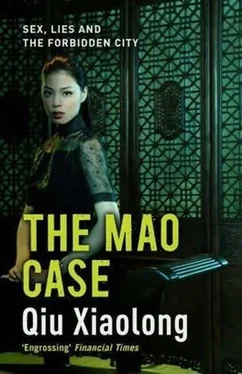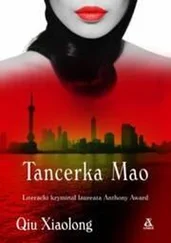Peiqin bought everything on the list, choosing some other special sauce and seasonings for the night. According to Yu and Old Hunter, Jiao seldom if ever invited people home. Yet, for a slender girl like her, it appeared to be a huge dinner with a lot of calories and fat. The fat pork braised in red sauce, in particular, once popular in the early sixties for the starved, ill-nourished Chinese people, was practically unimaginable for fashionable diet-conscious girls.
Back in the kitchen, she started preparing. The live fish kept struggling and jumping while she scaled it on the board. As she put it into the steamer, the fish twitched one more time, its tail cutting her finger. The cut wasn’t deep, but it tingled. She arranged the fish on a willow-patterned platter along with ginger and scallion and set it in a steamer on the kitchen table. Jiao needed only to turn on the fire upon her return. Peiqin rinsed the rice and put it into an electric rice pot. She finally started working on the pork. It was easy, but took time. She was no restaurant chef but she was a capable cook, and wanted to impress on her first day.
Taking off her apron again, she made a cup of tea for herself, choosing a European tea bag she hadn’t seen before. She sat on a folding chair close to the table. Breathing into the hot tea, she found the taste not nearly as good as the Dragon Well tea at home. Perhaps the tea bag caused the difference. She like watching leisurely the unfolding of the tea leaves in the cup, green, tender, musing.
She had helped with police work before, because of her husband or Chief Inspector Chen, or because of the people involved.
But this time, it was different.
She felt drawn to the case because of something personal, yet far more than personal.
Peiqin had been a straight-A student in elementary school, wearing the Red Scarf of a proud Young Pioneer, dreaming of a rosy future in the golden sunlight of socialist China. Everything changed overnight, however, with the outbreak of the Cultural Revolution. Her father’s “historical problem” cast a shadow over the whole family. Youthful dreams shattered, she came to terms with the realities – toiling and moiling as an educated youth in Yunnan, plowing barefoot in the rice paddy, plodding through the muddy trails, day in and day out… and ten years later, coming back to the city, working at a tingzijian restaurant office with wok fumes and kitchen noises erupting from downstairs, and squeezing into a single room without a kitchen or bathroom, with Yu and Qinqin eking out whatever was available… She had been too busy, sometimes working two jobs, to be maudlin about her life. And she had kept telling herself that she was a lucky one – a good husband and a wonderful son, what else could she really expect? At a recent class reunion, Yu and she were actually voted the luckiest couple – both had stable jobs, a room they called their own, and a son studying hard for college. After all, the Cultural Revolution had been a national disaster, not just for her family but for millions and millions of Chinese people.
Occasionally, she still couldn’t help wondering what life would have been like without the Cultural Revolution.
The cut on her finger stung again.
Who was responsible for it?
Mao.
The government didn’t want people to talk about it, tried to avoid the topic or to shift the blame to the Gang of Four. As for Mao, it was said that he had made a well-meant mistake, which was nothing compared to the great contributions he’d made to China.
Perhaps she was in no position to judge Mao, not historically, but what about personally, from the perspective of one whose life had been so affected by those political movements under Mao?
Her personal factors aside, there was no forgiving Mao for what she had just learned from Old Hunter – for what Mao had done to Kaihui.
As a young girl, she had read Mao’s poem to Kaihui, cherishing it as a moving revolutionary love poem. She had also read an earlier one on parting with Kaihui, even more sentimental and touching in her imagination.
Now, what a shock when she learned the truth behind the poems! It wasn’t simply a brazen betrayal by Mao; it was practically cold-blooded murder. Mao must have seen Kaihui as an obstacle to his affair with Zizhen, so he had let Kaihui stay where she was, to fall prey to the nationalists’ retaliation. Did Kaihui know it in her last days? Peiqin’s eyes watered at the thought of Kaihui being dragged to the execution ground, her bare feet bleeding all the way – following the local superstition that the executed couldn’t find her way back home without her shoes.
And Peiqin had no doubt about Mao’s desertion of Shang. After rereading Cloud and Rain in Shanghai, Peiqin lay awake for the night. It was nothing, historically, for someone like Mao to have used and discarded a woman like a worn-out mop. But what about Shang, an equal human being?
Standing up, Peiqin went into the bedroom again. Gazing at Mao’s picture above the bed, she realized that it was a portrait not so commonly seen, not now, not since the days of the Cultural Revolution. Mao was sitting in a rattan chair, wearing a blue-and-white-striped terrycloth robe, smoking a cigarette, and smiling toward the distant horizon, the immediate background of the picture suggestive of a riverboat. Presumably it was a picture taken after a swim in the Yangtze River.
Was it possible that Jiao, after the fashion of recent years, had “re-discovered” Mao? Chinese people had always been interested in emperors – for thousands of years. There was a “royal revival” going on in movies and on TV, and the Qing emperors and empresses abounded in current bestsellers.
But how could Jiao, of all people, have entertained any fond fantasies of Mao – since Mao was responsible for the tragedies of her family?
And the Mao mystery aside, how could a young girl like Jiao afford to live like this without a job?
It was possible that Jiao was a kept woman, or “little concubine”- ernai, a new term that was gaining currency quickly in the contemporary Chinese vocabulary.
But Internal Security hadn’t found a “keeper” in the background, though somebody had been seen in her company, at least once, in the apartment here. For a young woman like Jiao, there was nothing surprising about an occasional visitor or two.
Peiqin pulled out of her thoughts. She hardly knew anything about Jiao, a girl from a different generation and of a different family background. There was no point in speculating too much.
Nor did she have any idea what Chen was really after. As a cop’s wife, she had no objection to snooping around for her husband’s sake, or that of his boss, but she would have liked more clues about what she was looking for.
Again, she glanced at her watch. Jiao wouldn’t come back this early. Peiqin decided to start her “search proper.”
She proceeded cautiously, pulling out the drawers, looking under the bed, examining the closet, rummaging through the boxes… From a mystery she had read, she learned that people could purposely hide things in the most obvious places, to which she also paid close attention. After spending nearly an hour going through every nook and cranny, she found little except things that further reinforced her earlier impression of Jiao’s being obsessed with Mao.
In a drawer, Peiqin found several tapes of documentaries showing Mao receiving foreign visitors in the Forbidden City. Some of them she might have seen in Yunnan in the early seventies; it was during a time when hardly any movies were shown except the eight modern revolutionary model plays and documentaries of Mao. Peiqin and Yu would joke that Mao was the biggest movie star.
How could Jiao have gotten hold of these? Peiqin was tempted to put a tape into the player, but she decided against it. Jiao might notice it had been played.
Читать дальше












